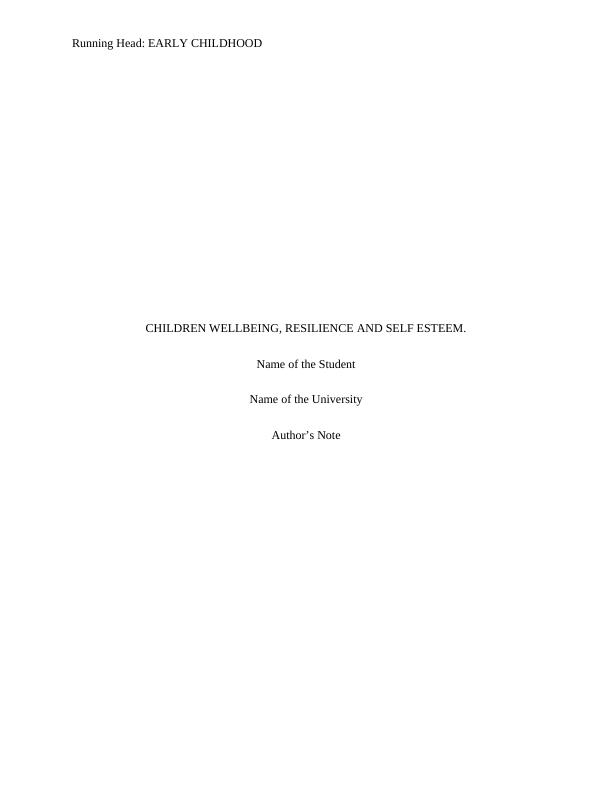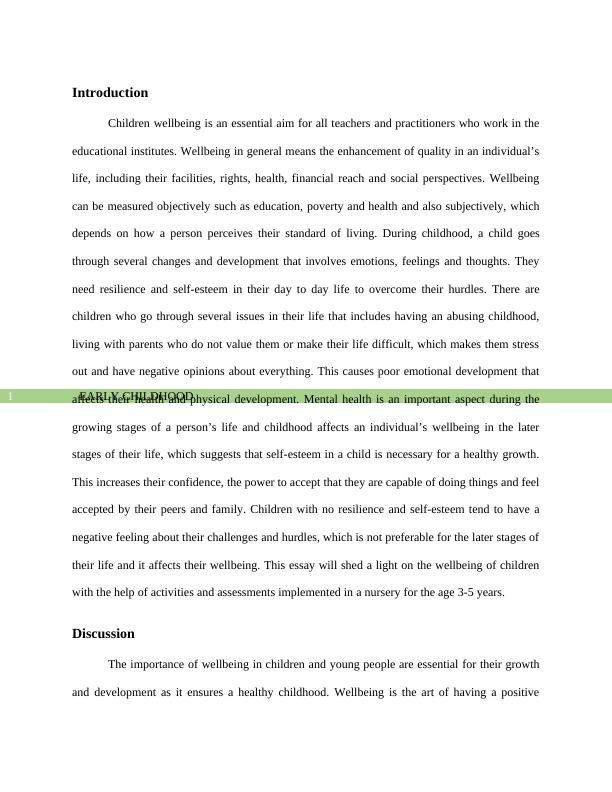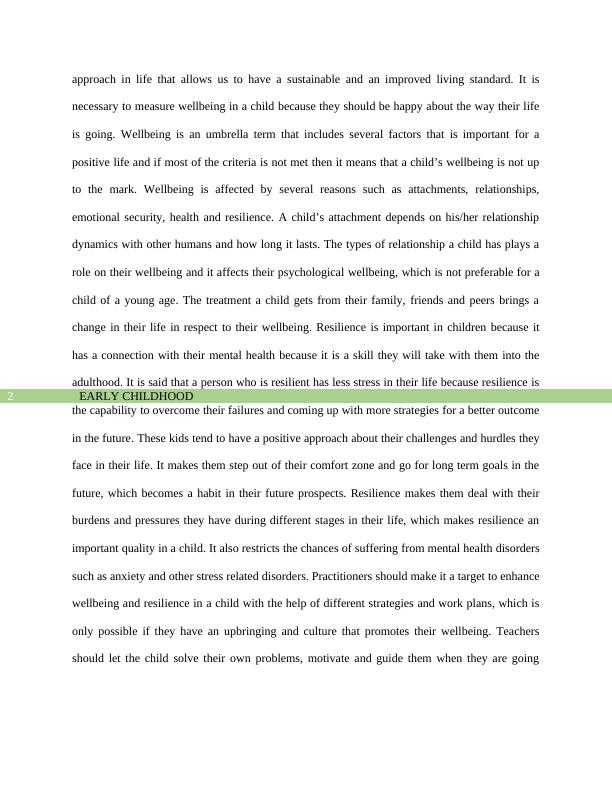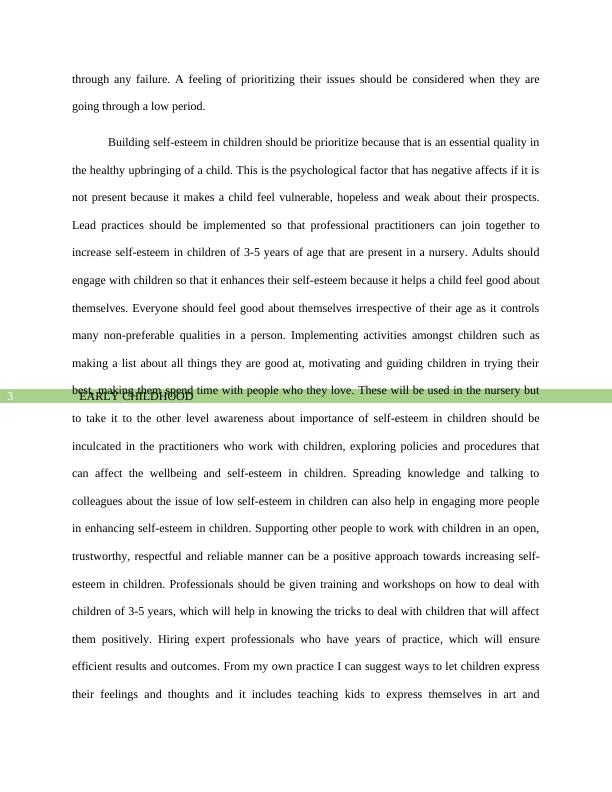THE EARLY CHILDHOOD
Summary of departmental advice for school staff on promoting positive mental health, identifying children with possible mental health problems, interventions, referral and commissioning.
12 Pages3354 Words39 Views
Added on 2022-08-29
THE EARLY CHILDHOOD
Summary of departmental advice for school staff on promoting positive mental health, identifying children with possible mental health problems, interventions, referral and commissioning.
Added on 2022-08-29
ShareRelated Documents
Running Head: EARLY CHILDHOOD
CHILDREN WELLBEING, RESILIENCE AND SELF ESTEEM.
Name of the Student
Name of the University
Author’s Note
CHILDREN WELLBEING, RESILIENCE AND SELF ESTEEM.
Name of the Student
Name of the University
Author’s Note

EARLY CHILDHOOD1
Introduction
Children wellbeing is an essential aim for all teachers and practitioners who work in the
educational institutes. Wellbeing in general means the enhancement of quality in an individual’s
life, including their facilities, rights, health, financial reach and social perspectives. Wellbeing
can be measured objectively such as education, poverty and health and also subjectively, which
depends on how a person perceives their standard of living. During childhood, a child goes
through several changes and development that involves emotions, feelings and thoughts. They
need resilience and self-esteem in their day to day life to overcome their hurdles. There are
children who go through several issues in their life that includes having an abusing childhood,
living with parents who do not value them or make their life difficult, which makes them stress
out and have negative opinions about everything. This causes poor emotional development that
affects their health and physical development. Mental health is an important aspect during the
growing stages of a person’s life and childhood affects an individual’s wellbeing in the later
stages of their life, which suggests that self-esteem in a child is necessary for a healthy growth.
This increases their confidence, the power to accept that they are capable of doing things and feel
accepted by their peers and family. Children with no resilience and self-esteem tend to have a
negative feeling about their challenges and hurdles, which is not preferable for the later stages of
their life and it affects their wellbeing. This essay will shed a light on the wellbeing of children
with the help of activities and assessments implemented in a nursery for the age 3-5 years.
Discussion
The importance of wellbeing in children and young people are essential for their growth
and development as it ensures a healthy childhood. Wellbeing is the art of having a positive
Introduction
Children wellbeing is an essential aim for all teachers and practitioners who work in the
educational institutes. Wellbeing in general means the enhancement of quality in an individual’s
life, including their facilities, rights, health, financial reach and social perspectives. Wellbeing
can be measured objectively such as education, poverty and health and also subjectively, which
depends on how a person perceives their standard of living. During childhood, a child goes
through several changes and development that involves emotions, feelings and thoughts. They
need resilience and self-esteem in their day to day life to overcome their hurdles. There are
children who go through several issues in their life that includes having an abusing childhood,
living with parents who do not value them or make their life difficult, which makes them stress
out and have negative opinions about everything. This causes poor emotional development that
affects their health and physical development. Mental health is an important aspect during the
growing stages of a person’s life and childhood affects an individual’s wellbeing in the later
stages of their life, which suggests that self-esteem in a child is necessary for a healthy growth.
This increases their confidence, the power to accept that they are capable of doing things and feel
accepted by their peers and family. Children with no resilience and self-esteem tend to have a
negative feeling about their challenges and hurdles, which is not preferable for the later stages of
their life and it affects their wellbeing. This essay will shed a light on the wellbeing of children
with the help of activities and assessments implemented in a nursery for the age 3-5 years.
Discussion
The importance of wellbeing in children and young people are essential for their growth
and development as it ensures a healthy childhood. Wellbeing is the art of having a positive

EARLY CHILDHOOD2
approach in life that allows us to have a sustainable and an improved living standard. It is
necessary to measure wellbeing in a child because they should be happy about the way their life
is going. Wellbeing is an umbrella term that includes several factors that is important for a
positive life and if most of the criteria is not met then it means that a child’s wellbeing is not up
to the mark. Wellbeing is affected by several reasons such as attachments, relationships,
emotional security, health and resilience. A child’s attachment depends on his/her relationship
dynamics with other humans and how long it lasts. The types of relationship a child has plays a
role on their wellbeing and it affects their psychological wellbeing, which is not preferable for a
child of a young age. The treatment a child gets from their family, friends and peers brings a
change in their life in respect to their wellbeing. Resilience is important in children because it
has a connection with their mental health because it is a skill they will take with them into the
adulthood. It is said that a person who is resilient has less stress in their life because resilience is
the capability to overcome their failures and coming up with more strategies for a better outcome
in the future. These kids tend to have a positive approach about their challenges and hurdles they
face in their life. It makes them step out of their comfort zone and go for long term goals in the
future, which becomes a habit in their future prospects. Resilience makes them deal with their
burdens and pressures they have during different stages in their life, which makes resilience an
important quality in a child. It also restricts the chances of suffering from mental health disorders
such as anxiety and other stress related disorders. Practitioners should make it a target to enhance
wellbeing and resilience in a child with the help of different strategies and work plans, which is
only possible if they have an upbringing and culture that promotes their wellbeing. Teachers
should let the child solve their own problems, motivate and guide them when they are going
approach in life that allows us to have a sustainable and an improved living standard. It is
necessary to measure wellbeing in a child because they should be happy about the way their life
is going. Wellbeing is an umbrella term that includes several factors that is important for a
positive life and if most of the criteria is not met then it means that a child’s wellbeing is not up
to the mark. Wellbeing is affected by several reasons such as attachments, relationships,
emotional security, health and resilience. A child’s attachment depends on his/her relationship
dynamics with other humans and how long it lasts. The types of relationship a child has plays a
role on their wellbeing and it affects their psychological wellbeing, which is not preferable for a
child of a young age. The treatment a child gets from their family, friends and peers brings a
change in their life in respect to their wellbeing. Resilience is important in children because it
has a connection with their mental health because it is a skill they will take with them into the
adulthood. It is said that a person who is resilient has less stress in their life because resilience is
the capability to overcome their failures and coming up with more strategies for a better outcome
in the future. These kids tend to have a positive approach about their challenges and hurdles they
face in their life. It makes them step out of their comfort zone and go for long term goals in the
future, which becomes a habit in their future prospects. Resilience makes them deal with their
burdens and pressures they have during different stages in their life, which makes resilience an
important quality in a child. It also restricts the chances of suffering from mental health disorders
such as anxiety and other stress related disorders. Practitioners should make it a target to enhance
wellbeing and resilience in a child with the help of different strategies and work plans, which is
only possible if they have an upbringing and culture that promotes their wellbeing. Teachers
should let the child solve their own problems, motivate and guide them when they are going

EARLY CHILDHOOD3
through any failure. A feeling of prioritizing their issues should be considered when they are
going through a low period.
Building self-esteem in children should be prioritize because that is an essential quality in
the healthy upbringing of a child. This is the psychological factor that has negative affects if it is
not present because it makes a child feel vulnerable, hopeless and weak about their prospects.
Lead practices should be implemented so that professional practitioners can join together to
increase self-esteem in children of 3-5 years of age that are present in a nursery. Adults should
engage with children so that it enhances their self-esteem because it helps a child feel good about
themselves. Everyone should feel good about themselves irrespective of their age as it controls
many non-preferable qualities in a person. Implementing activities amongst children such as
making a list about all things they are good at, motivating and guiding children in trying their
best, making them spend time with people who they love. These will be used in the nursery but
to take it to the other level awareness about importance of self-esteem in children should be
inculcated in the practitioners who work with children, exploring policies and procedures that
can affect the wellbeing and self-esteem in children. Spreading knowledge and talking to
colleagues about the issue of low self-esteem in children can also help in engaging more people
in enhancing self-esteem in children. Supporting other people to work with children in an open,
trustworthy, respectful and reliable manner can be a positive approach towards increasing self-
esteem in children. Professionals should be given training and workshops on how to deal with
children of 3-5 years, which will help in knowing the tricks to deal with children that will affect
them positively. Hiring expert professionals who have years of practice, which will ensure
efficient results and outcomes. From my own practice I can suggest ways to let children express
their feelings and thoughts and it includes teaching kids to express themselves in art and
through any failure. A feeling of prioritizing their issues should be considered when they are
going through a low period.
Building self-esteem in children should be prioritize because that is an essential quality in
the healthy upbringing of a child. This is the psychological factor that has negative affects if it is
not present because it makes a child feel vulnerable, hopeless and weak about their prospects.
Lead practices should be implemented so that professional practitioners can join together to
increase self-esteem in children of 3-5 years of age that are present in a nursery. Adults should
engage with children so that it enhances their self-esteem because it helps a child feel good about
themselves. Everyone should feel good about themselves irrespective of their age as it controls
many non-preferable qualities in a person. Implementing activities amongst children such as
making a list about all things they are good at, motivating and guiding children in trying their
best, making them spend time with people who they love. These will be used in the nursery but
to take it to the other level awareness about importance of self-esteem in children should be
inculcated in the practitioners who work with children, exploring policies and procedures that
can affect the wellbeing and self-esteem in children. Spreading knowledge and talking to
colleagues about the issue of low self-esteem in children can also help in engaging more people
in enhancing self-esteem in children. Supporting other people to work with children in an open,
trustworthy, respectful and reliable manner can be a positive approach towards increasing self-
esteem in children. Professionals should be given training and workshops on how to deal with
children of 3-5 years, which will help in knowing the tricks to deal with children that will affect
them positively. Hiring expert professionals who have years of practice, which will ensure
efficient results and outcomes. From my own practice I can suggest ways to let children express
their feelings and thoughts and it includes teaching kids to express themselves in art and

End of preview
Want to access all the pages? Upload your documents or become a member.
Related Documents
Welfare Practice with Children, Young People and their Carers Research Paper 2022lg...
|12
|2765
|15
Early Childhood Education and Carelg...
|5
|724
|169
ECE304 Early Childhood Care and Educationlg...
|13
|3661
|366
Wellness and Wellbeing of early Childhood PDFlg...
|9
|2210
|284
Early Childhood Education and Care Research Paper 2022lg...
|11
|2950
|18
Establishment of Secure Attachment in Early Childhoodlg...
|8
|814
|124
